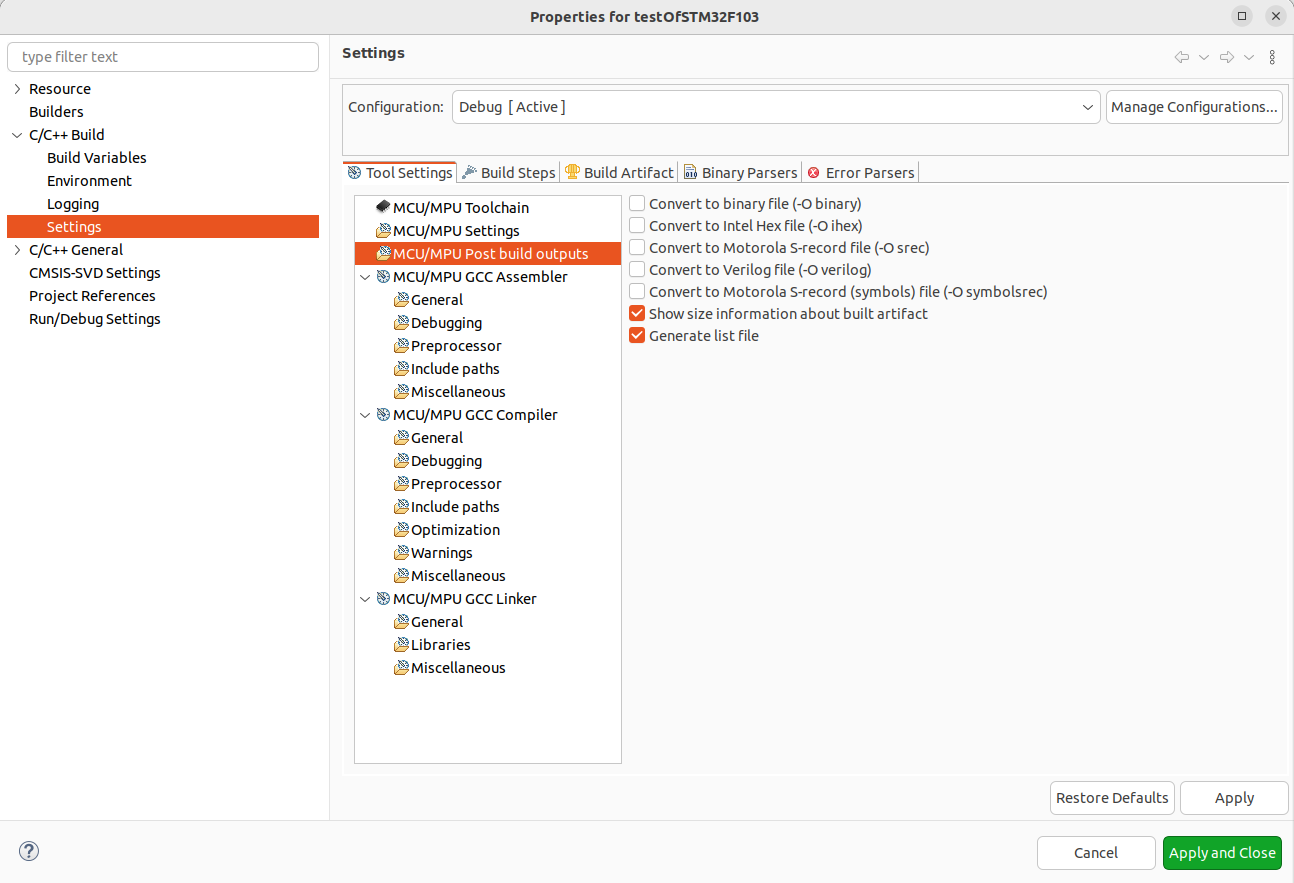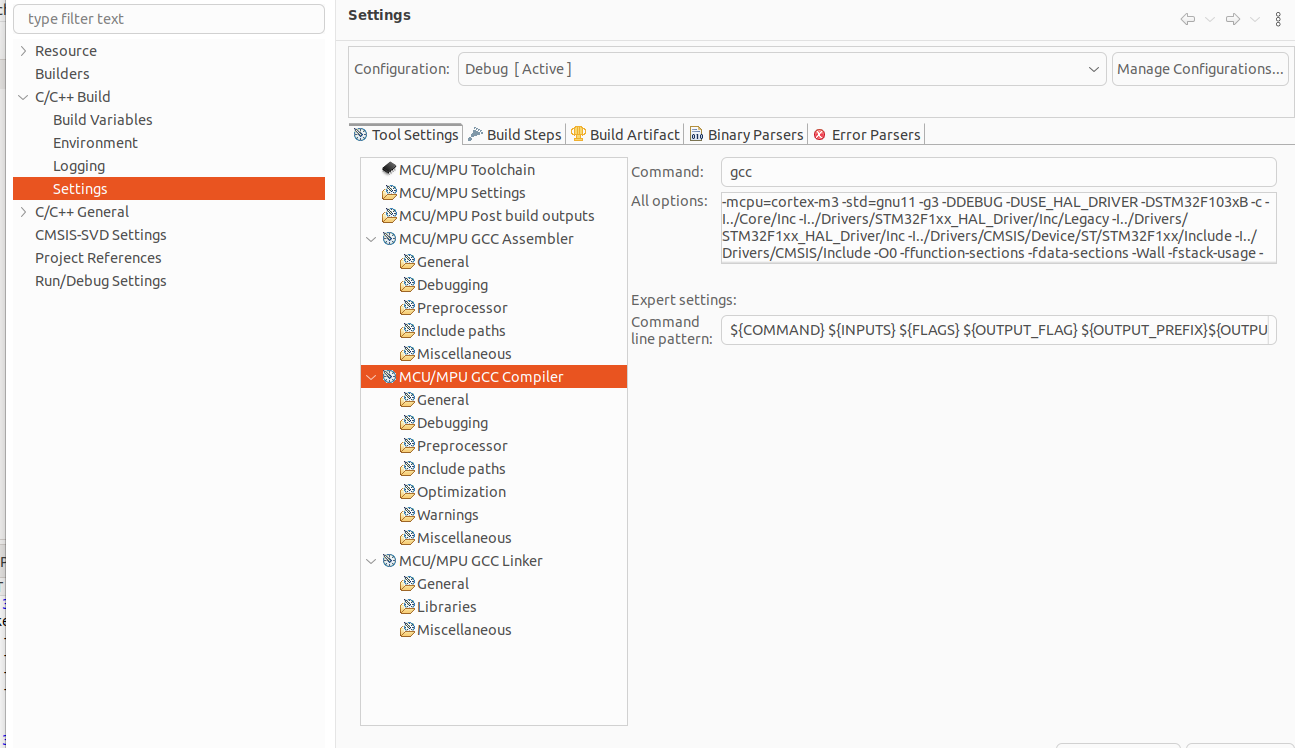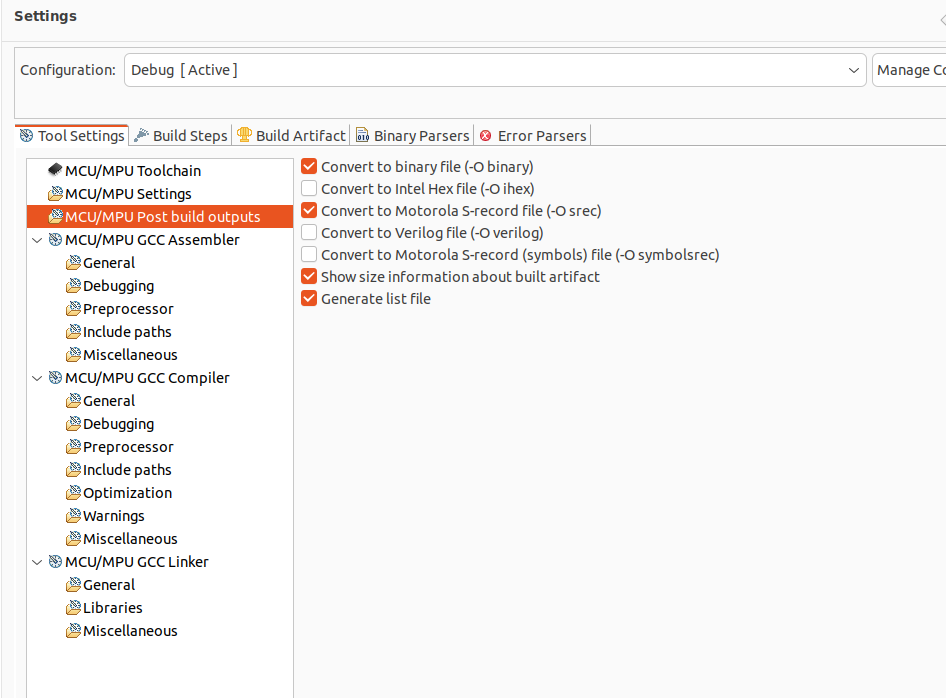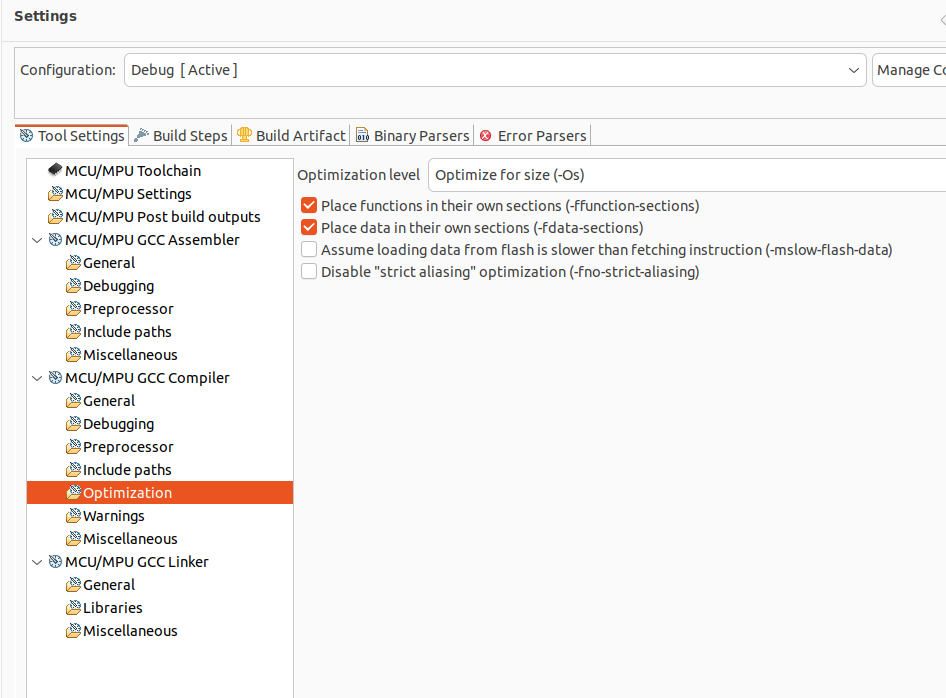En los proyectos documentados en este sitio web se utilizan varios Makefiles para automatizar la compilación, grabación y limpieza de proyectos embebidos. Este artículo explora cómo funcionan los Makefiles en diferentes entornos de desarrollo y proporciona ejemplos prácticos para microcontroladores AVR y STM32.
Makefile para Proyectos AVR
Con fines educativos y para entender el desarrollo de microcontroladores AVR en un entorno GNU/Linux puro, creé un Makefile integral para el proyecto AVR RGB LED Control{:target=”_blank”}. También escribí un artículo para explicar cómo usarlos con VSCode y herramientas de Linux: Construir y programar proyectos AVR en Linux{:target=”_blank”}
Estructura Básica del Makefile AVR
Para crear este Makefile, utilicé el Makefile autogenerado de Microchip Studio como modelo y lo adapté a mi pequeño proyecto.
# Makefile for building and flashing ATMEGA328p
# Variables
MCU = atmega328p
F_CPU = 8000000
SRC = src
BUILD_DIR = bin
BINARY_NAME = RGB_control
PROGRAMMER = usbasp
PORT = usb
LFUSE = 0xD2
HFUSE =
EFUSE =
# Compiler and linker flags
CFLAGS=-mmcu=$(MCU) -Wall -Os -DF_CPU=$(F_CPU)
LDFLAGS= -p $(MCU) -c $(PROGRAMMER) -P $(PORT)
# Rules
all: $(BUILD_DIR)/$(BINARY_NAME).hex
$(BUILD_DIR)/$(BINARY_NAME).elf: $(SRC)
@mkdir -p $(BUILD_DIR)
avr-gcc $(CFLAGS) $(SRC)/*.c $(SRC)/LED_control/*.c $(SRC)/timer_control/*.c -o $(BUILD_DIR)/$(BINARY_NAME).elf
$(BUILD_DIR)/$(BINARY_NAME).hex: $(BUILD_DIR)/$(BINARY_NAME).elf
avr-objcopy -j .text -j .data -O ihex $(BUILD_DIR)/$(BINARY_NAME).elf $(BUILD_DIR)/$(BINARY_NAME).hex -v
flash: $(BUILD_DIR)/$(BINARY_NAME).hex
avrdude $(LDFLAGS) -U flash:w:$(BUILD_DIR)/$(BINARY_NAME).hex:i
readFuses:
avrdude $(LDFLAGS) -U efuse:r:-:h -U hfuse:r:-:h -U lfuse:r:-:h
writeLowFuse:
avrdude $(LDFLAGS) -U lfuse:w:0xD2:m
clean:
rm -rf $(BUILD_DIR)
.PHONY: all flash clean
Mientras investigaba para escribir este artículo, obtuve una mejor comprensión de cómo funcionan los Makefiles, y con la ayuda de un chatbot de IA, pude mejorar este Makefile.
# ==============================================================================
# AVR Makefile for ATMEGA328p - RGB_control Example
# ==============================================================================
# Hardware Configuration
MCU = atmega328p
F_CPU = 8000000UL
PROGRAMMER = usbasp
PORT = usb
# Fuse Settings (8MHz internal oscillator)
LFUSE = 0xD2
HFUSE = 0xD9
EFUSE = 0xFF
# Project Structure
PROJECT_NAME = RGB_control
SRC_DIR = src
BUILD_DIR = bin
INCLUDE_DIR = include
# Source Files Discovery
SOURCES = $(wildcard $(SRC_DIR)/*.c) \
$(wildcard $(SRC_DIR)/*/*.c) #\ $(wildcard $(SRC_DIR)/*/*/*.c)
# Object Files (convert .c to .o and place in build directory)
OBJECTS = $(SOURCES:$(SRC_DIR)/%.c=$(BUILD_DIR)/%.o)
# Dependency Files (for automatic header dependency tracking)
DEPS = $(OBJECTS:.o=.d)
# Compiler and Tools
CC = avr-gcc
OBJCOPY = avr-objcopy
OBJDUMP = avr-objdump
SIZE = avr-size
AVRDUDE = avrdude
# Compiler Flags
CFLAGS = -mmcu=$(MCU) \
-DF_CPU=$(F_CPU) \
-I$(INCLUDE_DIR) \
-Os \
-Wall \
-Wundef \
-ffunction-sections \
-fdata-sections \
-MMD -MP
# Linker Flags
LDFLAGS = -mmcu=$(MCU) \
-Wl,--gc-sections \
-Wl,-Map=$(BUILD_DIR)/$(PROJECT_NAME).map
# AVRdude Flags
AVRDUDE_FLAGS = -p $(MCU) \
-c $(PROGRAMMER) \
-P $(PORT) \
# ==============================================================================
# Build Rules
# ==============================================================================
# Default target
all: $(BUILD_DIR)/$(PROJECT_NAME).hex size
# Create object files from C source files
$(BUILD_DIR)/%.o: $(SRC_DIR)/%.c
@echo "Compiling: $<"
@mkdir -p $(dir $@)
@$(CC) $(CFLAGS) -c $< -o $@
# Link object files to create ELF executable
$(BUILD_DIR)/$(PROJECT_NAME).elf: $(OBJECTS)
@echo "Linking: $@"
@mkdir -p $(BUILD_DIR)
@$(CC) $(LDFLAGS) $(OBJECTS) -o $@
# Convert ELF to Intel HEX format
$(BUILD_DIR)/$(PROJECT_NAME).hex: $(BUILD_DIR)/$(PROJECT_NAME).elf
@echo "Creating HEX file: $@"
@$(OBJCOPY) -j .text -j .data -O ihex $< $@
# Display memory usage information
size: $(BUILD_DIR)/$(PROJECT_NAME).elf
@echo ""
@echo "Memory Usage:"
@$(SIZE) --format=avr --mcu=$(MCU) $<
@echo ""
# Create assembly listing (useful for debugging)
$(BUILD_DIR)/$(PROJECT_NAME).lss: $(BUILD_DIR)/$(PROJECT_NAME).elf
@echo "Creating assembly listing: $@"
@$(OBJDUMP) -h -S $< > $@
# ==============================================================================
# Programming Rules
# ==============================================================================
# Flash the program to microcontroller
flash: $(BUILD_DIR)/$(PROJECT_NAME).hex
@echo "Flashing $(PROJECT_NAME).hex to $(MCU)..."
@$(AVRDUDE) $(AVRDUDE_FLAGS) -U flash:w:$<:i -v
# Verify the flashed program
verify: $(BUILD_DIR)/$(PROJECT_NAME).hex
@echo "Verifying flash memory..."
@$(AVRDUDE) $(AVRDUDE_FLAGS) -U flash:v:$<:i
# ==============================================================================
# Fuse Programming Rules
# ==============================================================================
# Read current fuse settings
rfuses:
@echo "Reading current fuse settings..."
@$(AVRDUDE) $(AVRDUDE_FLAGS) \
-U lfuse:r:-:h \
-U hfuse:r:-:h \
-U efuse:r:-:h
# Write all fuses (DANGEROUS - can brick your MCU!)
wfuses:
@echo "WARNING: Writing fuses can brick your microcontroller!"
@echo "Current settings: LFUSE=$(LFUSE), HFUSE=$(HFUSE), EFUSE=$(EFUSE)"
@read -p "Are you sure you want to continue? (yes/no): " confirm && \
if [ "$$confirm" = "yes" ]; then \
$(AVRDUDE) $(AVRDUDE_FLAGS) \
-U lfuse:w:$(LFUSE):m \
-U hfuse:w:$(HFUSE):m \
-U efuse:w:$(EFUSE):m; \
else \
echo "Fuse programming cancelled."; \
fi
# Write only low fuse (safer for clock settings)
wlfuse:
@echo "Writing low fuse: $(LFUSE)"
@$(AVRDUDE) $(AVRDUDE_FLAGS) -U lfuse:w:$(LFUSE):m
# ==============================================================================
# Utility Rules
# ==============================================================================
# Clean build artifacts
clean:
@echo "Cleaning build directory..."
@rm -rf $(BUILD_DIR)
# Show project information
info:
@echo "Project Information:"
@echo " Project Name: $(PROJECT_NAME)"
@echo " MCU: $(MCU)"
@echo " F_CPU: $(F_CPU) Hz"
@echo " Programmer: $(PROGRAMMER)"
@echo " Port: $(PORT)"
@echo ""
@echo "Fuse Settings:"
@echo " Low Fuse: $(LFUSE)"
@echo " High Fuse: $(HFUSE)"
@echo " Extended Fuse:$(EFUSE)"
@echo ""
@echo "Source Files:"
@$(foreach src,$(SOURCES),echo " $(src)";)
# Display available targets
help:
@echo "Available Make targets:"
@echo ""
@echo "Build targets:"
@echo " all - Build the complete project (default)"
@echo " clean - Remove build directory"
@echo " distclean - Deep clean (removes all build artifacts)"
@echo " size - Display memory usage information"
@echo ""
@echo "Programming targets:"
@echo " flash - Program the microcontroller"
@echo " verify - Verify the programmed flash"
@echo ""
@echo "Fuse targets:"
@echo " rfuses - Read current fuse settings"
@echo " wfuses - Write all fuses (DANGEROUS!)"
@echo " wlfuse - Write only low fuse"
@echo ""
@echo "Utility targets:"
@echo " info - Show project information"
@echo " help - Show this help message"
# ==============================================================================
# Special Targets
# ==============================================================================
# Prevent Make from deleting intermediate files
.PRECIOUS: $(BUILD_DIR)/%.o $(BUILD_DIR)/%.elf
# Declare phony targets (targets that don't create files)
.PHONY: all clean flash verify rfuses wfuses wlfuse info help size
# Include dependency files (for automatic recompilation when headers change)
-include $(DEPS)
Características Principales de este Makefile
-
Descubrimiento Automático de Código Fuente: Utiliza
wildcardpara encontrar todos los archivos.cen el directorio de código fuente -
Seguimiento de Dependencias: Rastrea automáticamente las dependencias de encabezados usando las banderas
-MMD-MP -
Optimización de Memoria: Usa -Os para optimización de tamaño y
--gc-sectionspara eliminación de código muerto - Características de Seguridad: Incluye mensajes de confirmación para operaciones potencialmente peligrosas como la programación de fusibles
- Salida Amigable al Usuario: Proporciona mensajes de estado claros e información de ayuda
Trabajando con los IDEs
La mayoría de los IDEs tienen herramientas para generar Makefiles automáticamente. A lo largo de mi experiencia, he usado IDEs basados en Eclipse para construir proyectos en C y C++. Hace años, no tenía idea de que el Makefile era creado por las herramientas del IDE hasta que necesité modificar los Makefiles yo mismo. Como la mayoría de mi aprendizaje, fue un proceso de probar, modificar, fallar, corregir y volver a intentar.
Eclipse
Al usar IDEs basados en Eclipse como STM32CubeIDE, el Makefile se modifica a través de las propiedades del proyecto. Con un proyecto abierto, puedes acceder a las propiedades de la siguiente manera:
- Acceder a las Propiedades del Proyecto: Ve al menú Proyecto y haz clic en Propiedades.
-
Configurar las Opciones de Compilación: Revisa C/C++ Build → Settings → Tool Settings:
- MCU/MPU Toolchain: Configura la cadena de herramientas ARM (opción del IDE o externa)
- MCU/MPU Settings: Ver información de la CPU
-
MCU/MPU Post build outputs: Establecer formatos de salida para los binarios

- MCU/MPU GCC Assembler: Configurar opciones del preprocesador y ensamblador
-
MCU/MPU GCC Compiler: Administrar opciones del compilador

- MCU/MPU GCC Linker: Configurar opciones de enlazado
- Entendiendo los Makefiles Generados: El IDE almacena el makefile en la ruta Release/Debug. Aquí hay un ejemplo de lo que se genera:
-include ../makefile.init
RM := rm -rf
# All of the sources participating in the build are defined here
-include sources.mk
-include Drivers/STM32F1xx_HAL_Driver/Src/subdir.mk
-include Core/Startup/subdir.mk
-include Core/Src/subdir.mk
-include objects.mk
ifneq ($(MAKECMDGOALS),clean)
ifneq ($(strip $(S_DEPS)),)
-include $(S_DEPS)
endif
ifneq ($(strip $(S_UPPER_DEPS)),)
-include $(S_UPPER_DEPS)
endif
ifneq ($(strip $(C_DEPS)),)
-include $(C_DEPS)
endif
endif
-include ../makefile.defs
OPTIONAL_TOOL_DEPS := \
$(wildcard ../makefile.defs) \
$(wildcard ../makefile.init) \
$(wildcard ../makefile.targets) \
BUILD_ARTIFACT_NAME := testOfSTM32F103
BUILD_ARTIFACT_EXTENSION := elf
BUILD_ARTIFACT_PREFIX :=
BUILD_ARTIFACT := $(BUILD_ARTIFACT_PREFIX)$(BUILD_ARTIFACT_NAME)$(if $(BUILD_ARTIFACT_EXTENSION),.$(BUILD_ARTIFACT_EXTENSION),)
# Add inputs and outputs from these tool invocations to the build variables
EXECUTABLES += \
testOfSTM32F103.elf \
MAP_FILES += \
testOfSTM32F103.map \
SIZE_OUTPUT += \
default.size.stdout \
OBJDUMP_LIST += \
testOfSTM32F103.list \
# All Target
all: main-build
# Main-build Target
main-build: testOfSTM32F103.elf secondary-outputs
# Tool invocations
testOfSTM32F103.elf testOfSTM32F103.map: $(OBJS) $(USER_OBJS) /home/octavioguendulain/STM32CubeIDE/workspace_1.16.1/testOfSTM32F103/STM32F103C8TX_FLASH.ld makefile objects.list $(OPTIONAL_TOOL_DEPS)
arm-none-eabi-gcc -o "testOfSTM32F103.elf" @"objects.list" $(USER_OBJS) $(LIBS) -mcpu=cortex-m3 -T"/home/octavioguendulain/STM32CubeIDE/workspace_1.16.1/testOfSTM32F103/STM32F103C8TX_FLASH.ld" --specs=nosys.specs -Wl,-Map="testOfSTM32F103.map" -Wl,--gc-sections -static --specs=nano.specs -mfloat-abi=soft -mthumb -Wl,--start-group -lc -lm -Wl,--end-group
@echo 'Finished building target: $@'
@echo ' '
default.size.stdout: $(EXECUTABLES) makefile objects.list $(OPTIONAL_TOOL_DEPS)
arm-none-eabi-size $(EXECUTABLES)
@echo 'Finished building: $@'
@echo ' '
testOfSTM32F103.list: $(EXECUTABLES) makefile objects.list $(OPTIONAL_TOOL_DEPS)
arm-none-eabi-objdump -h -S $(EXECUTABLES) > "testOfSTM32F103.list"
@echo 'Finished building: $@'
@echo ' '
# Other Targets
clean:
-$(RM) default.size.stdout testOfSTM32F103.elf testOfSTM32F103.list testOfSTM32F103.map
-@echo ' '
secondary-outputs: $(SIZE_OUTPUT) $(OBJDUMP_LIST)
fail-specified-linker-script-missing:
@echo 'Error: Cannot find the specified linker script. Check the linker settings in the build configuration.'
@exit 2
warn-no-linker-script-specified:
@echo 'Warning: No linker script specified. Check the linker settings in the build configuration.'
.PHONY: all clean dependents main-build fail-specified-linker-script-missing warn-no-linker-script-specified
-include ../makefile.targets
Punto Clave de Aprendizaje: Cuando modificas las configuraciones del IDE, los cambios se reflejan en los Makefiles generados.
Si cambias la configuración puedes ver los cambios en el makefile. Como ejemplo:
- Activa el archivo binario y s-record como salidas en Post build output.

-include ../makefile.init
RM := rm -rf
# All of the sources participating in the build are defined here
-include sources.mk
-include Drivers/STM32F1xx_HAL_Driver/Src/subdir.mk
-include Core/Startup/subdir.mk
-include Core/Src/subdir.mk
-include objects.mk
ifneq ($(MAKECMDGOALS),clean)
ifneq ($(strip $(S_DEPS)),)
-include $(S_DEPS)
endif
ifneq ($(strip $(S_UPPER_DEPS)),)
-include $(S_UPPER_DEPS)
endif
ifneq ($(strip $(C_DEPS)),)
-include $(C_DEPS)
endif
endif
-include ../makefile.defs
OPTIONAL_TOOL_DEPS := \
$(wildcard ../makefile.defs) \
$(wildcard ../makefile.init) \
$(wildcard ../makefile.targets) \
BUILD_ARTIFACT_NAME := testOfSTM32F103
BUILD_ARTIFACT_EXTENSION := elf
BUILD_ARTIFACT_PREFIX :=
BUILD_ARTIFACT := $(BUILD_ARTIFACT_PREFIX)$(BUILD_ARTIFACT_NAME)$(if $(BUILD_ARTIFACT_EXTENSION),.$(BUILD_ARTIFACT_EXTENSION),)
# Add inputs and outputs from these tool invocations to the build variables
EXECUTABLES += \
testOfSTM32F103.elf \
MAP_FILES += \
testOfSTM32F103.map \
SIZE_OUTPUT += \
default.size.stdout \
OBJDUMP_LIST += \
testOfSTM32F103.list \
OBJCOPY_BIN += \
testOfSTM32F103.bin \
OBJCOPY_SREC += \
testOfSTM32F103.srec \
# All Target
all: main-build
# Main-build Target
main-build: testOfSTM32F103.elf secondary-outputs
# Tool invocations
testOfSTM32F103.elf testOfSTM32F103.map: $(OBJS) $(USER_OBJS) /home/octavioguendulain/STM32CubeIDE/workspace_1.16.1/testOfSTM32F103/STM32F103C8TX_FLASH.ld makefile objects.list $(OPTIONAL_TOOL_DEPS)
arm-none-eabi-gcc -o "testOfSTM32F103.elf" @"objects.list" $(USER_OBJS) $(LIBS) -mcpu=cortex-m3 -T"/home/octavioguendulain/STM32CubeIDE/workspace_1.16.1/testOfSTM32F103/STM32F103C8TX_FLASH.ld" --specs=nosys.specs -Wl,-Map="testOfSTM32F103.map" -Wl,--gc-sections -static --specs=nano.specs -mfloat-abi=soft -mthumb -Wl,--start-group -lc -lm -Wl,--end-group
@echo 'Finished building target: $@'
@echo ' '
default.size.stdout: $(EXECUTABLES) makefile objects.list $(OPTIONAL_TOOL_DEPS)
arm-none-eabi-size $(EXECUTABLES)
@echo 'Finished building: $@'
@echo ' '
testOfSTM32F103.list: $(EXECUTABLES) makefile objects.list $(OPTIONAL_TOOL_DEPS)
arm-none-eabi-objdump -h -S $(EXECUTABLES) > "testOfSTM32F103.list"
@echo 'Finished building: $@'
@echo ' '
testOfSTM32F103.bin: $(EXECUTABLES) makefile objects.list $(OPTIONAL_TOOL_DEPS)
arm-none-eabi-objcopy -O binary $(EXECUTABLES) "testOfSTM32F103.bin"
@echo 'Finished building: $@'
@echo ' '
testOfSTM32F103.srec: $(EXECUTABLES) makefile objects.list $(OPTIONAL_TOOL_DEPS)
arm-none-eabi-objcopy -O srec $(EXECUTABLES) "testOfSTM32F103.srec"
@echo 'Finished building: $@'
@echo ' '
# Other Targets
clean:
-$(RM) default.size.stdout testOfSTM32F103.bin testOfSTM32F103.elf testOfSTM32F103.list testOfSTM32F103.map testOfSTM32F103.srec
-@echo ' '
secondary-outputs: $(SIZE_OUTPUT) $(OBJDUMP_LIST) $(OBJCOPY_BIN) $(OBJCOPY_SREC)
fail-specified-linker-script-missing:
@echo 'Error: Cannot find the specified linker script. Check the linker settings in the build configuration.'
@exit 2
warn-no-linker-script-specified:
@echo 'Warning: No linker script specified. Check the linker settings in the build configuration.'
.PHONY: all clean dependents main-build fail-specified-linker-script-missing warn-no-linker-script-specified
-include ../makefile.targets
-
Configura Optimizar para tamaño (-Os) en GCC Compiler/Optimization (En el caso de Debug)

Los cambios se almacenan en los archivos subdir.mk
diff --git a/Debug/Core/Src/subdir.mk b/Debug/Core/Src/subdir.mk
index 878ade1..74e68c0 100644
--- a/Debug/Core/Src/subdir.mk
+++ b/Debug/Core/Src/subdir.mk
@@ -31,7 +31,7 @@ C_DEPS += \
# Each subdirectory must supply rules for building sources it contributes
Core/Src/%.o Core/Src/%.su Core/Src/%.cyclo: ../Core/Src/%.c Core/Src/subdir.mk
- arm-none-eabi-gcc "$<" -mcpu=cortex-m3 -std=gnu11 -g3 -DDEBUG -DUSE_HAL_DRIVER -DSTM32F103xB -c -I../Core/Inc -I../Drivers/STM32F1xx_HAL_Driver/Inc/Legacy -I../Drivers/STM32F1xx_HAL_Driver/Inc -I../Drivers/CMSIS/Device/ST/STM32F1xx/Include -I../Drivers/CMSIS/Include -O0 -ffunction-sections -fdata-sections -Wall -fstack-usage -fcyclomatic-complexity -MMD -MP -MF"$(@:%.o=%.d)" -MT"$@" --specs=nano.specs -mfloat-abi=soft -mthumb -o "$@"
+ arm-none-eabi-gcc "$<" -mcpu=cortex-m3 -std=gnu11 -g3 -DDEBUG -DUSE_HAL_DRIVER -DSTM32F103xB -c -I../Core/Inc -I../Drivers/STM32F1xx_HAL_Driver/Inc/Legacy -I../Drivers/STM32F1xx_HAL_Driver/Inc -I../Drivers/CMSIS/Device/ST/STM32F1xx/Include -I../Drivers/CMSIS/Include -Os -ffunction-sections -fdata-sections -Wall -fstack-usage -fcyclomatic-complexity -MMD -MP -MF"$(@:%.o=%.d)" -MT"$@" --specs=nano.specs -mfloat-abi=soft -mthumb -o "$@"
clean: clean-Core-2f-Src
diff --git a/Debug/Drivers/STM32F1xx_HAL_Driver/Src/subdir.mk b/Debug/Drivers/STM32F1xx_HAL_Driver/Src/subdir.mk
index 372c133..629c746 100644
--- a/Debug/Drivers/STM32F1xx_HAL_Driver/Src/subdir.mk
+++ b/Debug/Drivers/STM32F1xx_HAL_Driver/Src/subdir.mk
@@ -58,7 +58,7 @@ C_DEPS += \
# Each subdirectory must supply rules for building sources it contributes
Drivers/STM32F1xx_HAL_Driver/Src/%.o Drivers/STM32F1xx_HAL_Driver/Src/%.su Drivers/STM32F1xx_HAL_Driver/Src/%.cyclo: ../Drivers/STM32F1xx_HAL_Driver/Src/%.c Drivers/STM32F1xx_HAL_Driver/Src/subdir.mk
- arm-none-eabi-gcc "$<" -mcpu=cortex-m3 -std=gnu11 -g3 -DDEBUG -DUSE_HAL_DRIVER -DSTM32F103xB -c -I../Core/Inc -I../Drivers/STM32F1xx_HAL_Driver/Inc/Legacy -I../Drivers/STM32F1xx_HAL_Driver/Inc -I../Drivers/CMSIS/Device/ST/STM32F1xx/Include -I../Drivers/CMSIS/Include -O0 -ffunction-sections -fdata-sections -Wall -fstack-usage -fcyclomatic-complexity -MMD -MP -MF"$(@:%.o=%.d)" -MT"$@" --specs=nano.specs -mfloat-abi=soft -mthumb -o "$@"
+ arm-none-eabi-gcc "$<" -mcpu=cortex-m3 -std=gnu11 -g3 -DDEBUG -DUSE_HAL_DRIVER -DSTM32F103xB -c -I../Core/Inc -I../Drivers/STM32F1xx_HAL_Driver/Inc/Legacy -I../Drivers/STM32F1xx_HAL_Driver/Inc -I../Drivers/CMSIS/Device/ST/STM32F1xx/Include -I../Drivers/CMSIS/Include -Os -ffunction-sections -fdata-sections -Wall -fstack-usage -fcyclomatic-complexity -MMD -MP -MF"$(@:%.o=%.d)" -MT"$@" --specs=nano.specs -mfloat-abi=soft -mthumb -o "$@"
clean: clean-Drivers-2f-STM32F1xx_HAL_Driver-2f-Src
Nota: Mi método para aprender nuevas herramientas es examinar múltiples ejemplos y entender qué sucede al construir proyectos o ejecutables. Por eso te muestro cómo cambian los archivos autogenerados.
Makefile utilizado para STM32 con GCC
Para los proyectos documentados en este sitio web, los Makefiles se basaron en la estructura proporcionada por el bootloader OpenBLT{:target=”_blank”}. Esto sirvió como punto de partida para crear Makefiles personalizados adaptados a los requisitos específicos de cada proyecto.
SHELL = sh
#|--------------------------------------------------------------------------------------|
#| Configure project name |
#|--------------------------------------------------------------------------------------|
PROJ_NAME=openblt_stm32f103
#|--------------------------------------------------------------------------------------|
#| Configure tool path |
#|--------------------------------------------------------------------------------------|
# Configure the path to where the arm-none-eabi-gcc program is located. If the program
# is available on the path, then the TOOL_PATH variable can be left empty.
TOOL_PATH=/opt/arm-gnu-toolchain-14.2.rel1-x86_64-arm-none-eabi/bin/
#|--------------------------------------------------------------------------------------|
#| Collect project files |
#|--------------------------------------------------------------------------------------|
# Recursive wildcard function implementation. Example usages:
# $(call rwildcard, , *.c *.h)
# --> Returns all *.c and *.h files in the current directory and below
# $(call rwildcard, /lib/, *.c)
# --> Returns all *.c files in the /lib directory and below
rwildcard = $(strip $(foreach d,$(wildcard $1*),$(call rwildcard,$d/,$2) $(filter $(subst *,%,$2),$d)))
# Collect all application files in the current directory and its subdirectories, but
# exclude flash-layout.c as this one is directly included in a source file, when used.
PROJ_FILES = $(filter-out flash_layout.c, $(call rwildcard, , *.c *.h *.s))
# Collect bootloader core files
PROJ_FILES += $(wildcard ../Source-openBLT/*.c)
PROJ_FILES += $(wildcard ../Source-openBLT/*.h)
# Collect bootloader port files
PROJ_FILES += $(wildcard ../Source-openBLT/ARMCM3_STM32F1/*.c)
PROJ_FILES += $(wildcard ../Source-openBLT/ARMCM3_STM32F1/*.h)
# Collect bootloader port compiler specific files
PROJ_FILES += $(wildcard ../Source-openBLT/ARMCM3_STM32F1/GCC/*.c)
PROJ_FILES += $(wildcard ../Source-openBLT/ARMCM3_STM32F1/GCC/*.h)
#|--------------------------------------------------------------------------------------|
#| Toolchain binaries |
#|--------------------------------------------------------------------------------------|
RM = rm
CC = $(TOOL_PATH)arm-none-eabi-gcc
LN = $(TOOL_PATH)arm-none-eabi-gcc
OC = $(TOOL_PATH)arm-none-eabi-objcopy
OD = $(TOOL_PATH)arm-none-eabi-objdump
AS = $(TOOL_PATH)arm-none-eabi-gcc
SZ = $(TOOL_PATH)arm-none-eabi-size
#|--------------------------------------------------------------------------------------|
#| Filter project files
#|--------------------------------------------------------------------------------------|
PROJ_ASRCS = $(filter %.s,$(foreach file,$(PROJ_FILES),$(notdir $(file))))
PROJ_CSRCS = $(filter %.c,$(foreach file,$(PROJ_FILES),$(notdir $(file))))
#|--------------------------------------------------------------------------------------|
#| Set important path variables |
#|--------------------------------------------------------------------------------------|
VPATH = $(foreach path,$(sort $(foreach file,$(PROJ_FILES),$(dir $(file)))) $(subst \,/,$(OBJ_PATH)),$(path) :)
OBJ_PATH = obj
BIN_PATH = bin
INC_PATH = $(patsubst %/,%,$(patsubst %,-I%,$(sort $(foreach file,$(filter %.h,$(PROJ_FILES)),$(dir $(file))))))
LIB_PATH =
#|--------------------------------------------------------------------------------------|
#| Options for toolchain binaries |
#|--------------------------------------------------------------------------------------|
STDFLAGS = -mcpu=cortex-m3 -mthumb -std=gnu11 -fstack-usage -Wall -specs=nano.specs
STDFLAGS += -fdata-sections -ffunction-sections -Wall -g -Wno-strict-aliasing
OPTFLAGS = -Os -flto
DEPFLAGS = -MT $@ -MMD -MP -MF $(OBJ_PATH)/$*.d
CFLAGS = $(STDFLAGS) $(OPTFLAGS)
CFLAGS += -DUSE_FULL_LL_DRIVER -DUSE_HAL_DRIVER -DSTM32F103xB
CFLAGS += -D__weak="__attribute__((weak))" -D__packed="__attribute__((__packed__))"
CFLAGS += $(INC_PATH)
AFLAGS = $(CFLAGS)
LFLAGS = $(STDFLAGS) $(OPTFLAGS)
LFLAGS += -T"STM32F103C8TX_FLASH.ld" -Wl,-Map=$(BIN_PATH)/$(PROJ_NAME).map
LFLAGS += -Wl,--gc-sections $(LIB_PATH)
OFLAGS = -O srec
ODFLAGS = -x
SZFLAGS = -B -d
RMFLAGS = -f
#|--------------------------------------------------------------------------------------|
#| Specify library files |
#|--------------------------------------------------------------------------------------|
LIBS =
#|--------------------------------------------------------------------------------------|
#| Define targets |
#|--------------------------------------------------------------------------------------|
AOBJS = $(patsubst %.s,%.o,$(PROJ_ASRCS))
COBJS = $(patsubst %.c,%.o,$(PROJ_CSRCS))
#|--------------------------------------------------------------------------------------|
#| Make ALL |
#|--------------------------------------------------------------------------------------|
.PHONY: prepare_dirs
prepare_dirs:
mkdir -p $(OBJ_PATH)
mkdir -p $(BIN_PATH)
.PHONY: all
all: prepare_dirs $(BIN_PATH)/$(PROJ_NAME).srec $(BIN_PATH)/$(PROJ_NAME).bin
$(BIN_PATH)/$(PROJ_NAME).srec : $(BIN_PATH)/$(PROJ_NAME).elf
@$(OC) $< $(OFLAGS) $@
@$(OD) $(ODFLAGS) $< > $(BIN_PATH)/$(PROJ_NAME).map
@echo +++ Summary of memory consumption:
@$(SZ) $(SZFLAGS) $<
@echo +++ Build complete [$(notdir $@)]
$(BIN_PATH)/$(PROJ_NAME).elf : $(AOBJS) $(COBJS)
@echo +++ Linking [$(notdir $@)]
@$(LN) $(LFLAGS) -o $@ $(patsubst %.o,$(OBJ_PATH)/%.o,$(^F)) $(LIBS)
.PHONY: $(BIN_PATH)/$(PROJ_NAME).bin
$(BIN_PATH)/$(PROJ_NAME).bin:
@$(OC) -O binary $(BIN_PATH)/$(PROJ_NAME).elf $@
#|--------------------------------------------------------------------------------------|
#| Compile and assemble |
#|--------------------------------------------------------------------------------------|
$(AOBJS): %.o: %.s
@echo +++ Assembling [$(notdir $<)]
@$(AS) $(AFLAGS) -c $< -o $(OBJ_PATH)/$(@F)
$(COBJS): %.o: %.c $(OBJ_PATH)/%.d
@echo +++ Compiling [$(notdir $<)]
@$(CC) $(DEPFLAGS) $(CFLAGS) -c $< -o $(OBJ_PATH)/$(@F)
#|--------------------------------------------------------------------------------------|
#| Make CLEAN |
#|--------------------------------------------------------------------------------------|
.PHONY: clean
clean:
@echo +++ Cleaning build environment
@$(RM) $(RMFLAGS) $(foreach file,$(AOBJS),$(OBJ_PATH)/$(file))
@$(RM) $(RMFLAGS) $(foreach file,$(COBJS),$(OBJ_PATH)/$(file))
@$(RM) $(RMFLAGS) $(patsubst %.o,%.lst,$(foreach file,$(AOBJS),$(OBJ_PATH)/$(file)))
@$(RM) $(RMFLAGS) $(patsubst %.o,%.lst,$(foreach file,$(COBJS),$(OBJ_PATH)/$(file)))
@$(RM) $(RMFLAGS) $(patsubst %.o,%.d,$(foreach file,$(COBJS),$(OBJ_PATH)/$(file)))
@$(RM) $(RMFLAGS) $(patsubst %.o,%.su,$(foreach file,$(COBJS),$(OBJ_PATH)/$(file)))
@$(RM) $(RMFLAGS) $(BIN_PATH)/$(PROJ_NAME).elf $(BIN_PATH)/$(PROJ_NAME).*.su $(BIN_PATH)/$(PROJ_NAME).bin $(BIN_PATH)/$(PROJ_NAME).map
@$(RM) $(RMFLAGS) $(BIN_PATH)/$(PROJ_NAME).srec
@echo +++ Clean complete
#|--------------------------------------------------------------------------------------|
#| Dependency generation |
#|--------------------------------------------------------------------------------------|
DEPFILES := $(PROJ_CSRCS:%.c=$(OBJ_PATH)/%.d)
$(DEPFILES):
include $(wildcard $(DEPFILES))
Mejores Prácticas y Conceptos Clave
1. Organización de Variables
- Configuration Variables: Coloca todos los elementos configurables (MCU, frecuencias, rutas) en la parte superior.
- Tool Variables: Define todas las herramientas en una sección para facilitar el mantenimiento.
-
Path Variables: Usa nombres consistentes para directorios (SRC_DIR, BUILD_DIR, etc.).
2. Seguimiento de Dependencias
Los Makefiles modernos deben rastrear automáticamente las dependencias de encabezados:
DEPFLAGS = -MT $@ -MMD -MP -MF $(OBJ_PATH)/$*.d
-include $(DEPS)
3. Reglas de Patrón
Usa reglas de patrón para escalabilidad:
$(BUILD_DIR)/%.o: $(SRC_DIR)/%.c
@$(CC) $(CFLAGS) $(DEPFLAGS) -c $< -o $@
4. Targets Ficticios
Siempre declara los objetivos que no son archivos como ficticios:
“Phony targets” es un concepto específico de Make donde los targets no corresponden a archivos reales
Always declare non-file targets as phony:
.PHONY: all clean flash help info
5. Salida Amigable al Usuario
- Usa
@echopara mensajes de estado. - Proporciona objetivos de ayuda e información.
- Muestra el uso de memoria después de la compilación.
6. Consideraciones de Seguridad
- Incluye mensajes de confirmación para operaciones peligrosas.
- Usa verificación de errores donde sea apropiado.
- Proporciona mensajes de error claros.
Conclusión
Comprender los Makefiles es crucial para el desarrollo embebido, especialmente cuando se trabaja fuera de IDEs o cuando necesitas control detallado sobre el proceso de construcción. Los ejemplos proporcionados muestran cómo crear Makefiles mantenibles y escalables que pueden manejar proyectos embebidos complejos. Puntos clave a recordar:
- Comienza con Makefiles generados por IDEs para entender los conceptos básicos.
- Usa características modernas de Makefile como el seguimiento automático de dependencias.
- Organiza tu Makefile con secciones claras y nombres consistentes.
- Siempre incluye características amigables al usuario como objetivos de ayuda y mensajes de estado.
- Prueba tus Makefiles exhaustivamente e incluye características de seguridad para operaciones peligrosas.
Ya sea que trabajes con microcontroladores AVR, dispositivos STM32 u otras plataformas embebidas, estos patrones y prácticas te ayudarán a crear sistemas de construcción robustos que crezcan con tus proyectos.